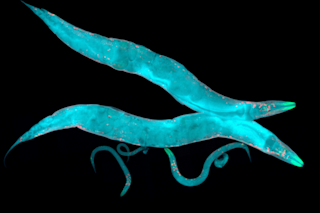Researchers have dosed microscopic hydra with cannabinoids to observe their feeding habits, and in 2000, a study at the University of Wisconsin-Oshkosh injected THC into the spinal fluid of rats and set them loose on some chocolate cake batter. The conclusion? The active ingredient in marijuana had effectively given munchies to the THC-injected rats, which ate more greedily.
Now a new study has extended the investigation to one of the best-studied organisms on the planet, Caenorhabditis elegans, a type of roundworm frequently used in lab experiments. Since around two-thirds of human disease genes are present in the worm, and about one-third of human genes overall, the results could open the door to further research into the human nervous system.
But first, the scientists from the University of Oregon Institute of Neuroscience had to answer some basic questions about the worms’ tiny nervous systems.
The worms normally feed on bacteria from ...














